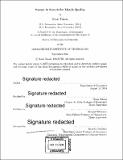| dc.contributor.advisor | Glenn Ellison and Michael Whinston. | en_US |
| dc.contributor.author | Takala, Kosti (Kosti Oskari) | en_US |
| dc.contributor.other | Massachusetts Institute of Technology. Department of Economics. | en_US |
| dc.date.accessioned | 2019-02-14T15:52:36Z | |
| dc.date.available | 2019-02-14T15:52:36Z | |
| dc.date.copyright | 2018 | en_US |
| dc.date.issued | 2018 | en_US |
| dc.identifier.uri | http://hdl.handle.net/1721.1/120449 | |
| dc.description | Thesis: Ph. D., Massachusetts Institute of Technology, Department of Economics, 2018. | en_US |
| dc.description | Cataloged from PDF version of thesis. | en_US |
| dc.description | Includes bibliographical references (pages 153-154). | en_US |
| dc.description.abstract | This thesis consists of three essays on search for reviews. In Chapter 1, I study how homogeneous consumers behave when they are considering to buy a new experience good, such as a pair of shoes, from a monopolist with an observable price. They have costly access to consumer reviews which are perfectly or imperfectly informative of match quality. Knowing how consumers behave, the monopolist sets an optimal price inducing certain behavior; sometimes the firm will find it optimal to set a high price to induce the consumers to search for earlier reviews, sometimes a low price to induce them to purchase the product. Consumer, producer and social surplus are non-monotone in search cost, and this result extends to settings with heterogeneous consumers. In Chapter 2, we extend the model of Chapter 1 to allow for competition between ex-ante identical firms. Consumers are homogeneous and all prices observed at no cost. They can search for earlier reviews which perfectly reveal match quality. Consumers can keep searching as long as they have not found a match or exhausted all of their options. We learn that high search costs lead to relatively high prices but when costs decrease, surplus is first transferred from firms to consumers but further reductions may decrease consumer surplus. Additional effects are noted as reviews get even cheaper to access, and consumer surplus, profits, and social surplus are all non-monotone in the cost of reading reviews. In Chapter 3, we analyze selection into consumption in the case of movies. People leaving reviews are assumed to be a representative sample of consumers, so that reviews perfectly reveal experiences. New consumers observe these reviews but do not know if their preferences are aligned with those of the reviewers. Examining two datasets with movie reviews and box office revenue, both in a cross-section of movies and within movies over time, we learn that selection decreases in the expected quality of a movie, the precision of the prior quality, and consumer homogeneity. Selection may increase or decrease over time and it tends to increase in the number of movies. Thesis Supervisor: Glenn Ellison Title: Gregory K. Palm Professor of Economics Thesis Supervisor: Michael Whinston Title: Sloan Fellows Professor of Management 3 | en_US |
| dc.description.statementofresponsibility | by Kosti Takala. | en_US |
| dc.format.extent | 154 pages | en_US |
| dc.language.iso | eng | en_US |
| dc.publisher | Massachusetts Institute of Technology | en_US |
| dc.rights | MIT theses are protected by copyright. They may be viewed, downloaded, or printed from this source but further reproduction or distribution in any format is prohibited without written permission. | en_US |
| dc.rights.uri | http://dspace.mit.edu/handle/1721.1/7582 | en_US |
| dc.subject | Economics. | en_US |
| dc.title | Essays in search for match quality | en_US |
| dc.type | Thesis | en_US |
| dc.description.degree | Ph. D. | en_US |
| dc.contributor.department | Massachusetts Institute of Technology. Department of Economics | |
| dc.identifier.oclc | 1084659050 | en_US |
